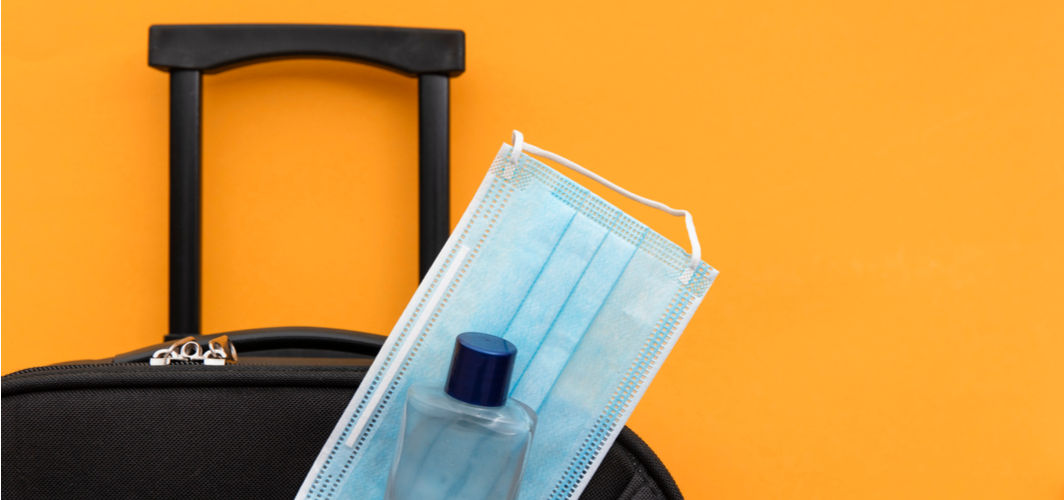Coronavirus Updates
Travelling After Lockdown? Carry These Travel Essentials With You
4 min read
By Apollo 24/7, Published on - 26 June 2020, Updated on - 18 October 2022
Share this article
10
41 likes

COVID-19 has brought our lives to a standstill and disrupted all our travel plans. As much as we want to travel again and explore places, traveling post lockdown will be quite different from what it used to be before this pandemic outbreak. With no definitive treatment for the novel Coronavirus yet, we need to take precautions to prevent getting infected while traveling. Some of the basic precautions are wearing masks, washing hands frequently, and practicing social distancing.
Besides taking precautions, it is also imperative to travel smart at this time of the pandemic. Try to limit the number of items that you carry usually while traveling. However, it might be prudent to carry a few travel essentials in this environment, for protection against the Coronavirus.
Recommended reading: How do I reduce the risk of getting COVID-19?
Alcohol-based hand sanitizers, masks, and gloves
Handwashing is one of the most effective ways to control the spread of Coronavirus infection. One should always wash hands with soap and water for at least 20 seconds to wash away dirt and germs. While traveling you may not always have access to soap and water. Hence, it is a good idea to carry a hand sanitizer. Global health organizations such as the World Health Organization (WHO) and the Centres of Disease Prevention and Control (CDC) recommend the use of a hand sanitizer containing at least 60% alcohol to clean your hands.
Also, keep extra masks and gloves in your travel bag, as you may not always be able to wash your hands. Make sure it is in the front pocket of your bag to have easy and quick access when needed. Avoid touching surfaces and interacting with people without your gloves and masks on.
Prepare a first-aid kit along with a few essential medicines
Medications and first aid kits might not be available everywhere during your journey. The right medicines and safety kits will safeguard you against injuries and minor health issues. Stomach infection, cough, cold, cuts, and wounds are common health problems that can appear anytime during your trip. Hence, it is important to be prepared than be sorry later. Some of the items that can be included in the first aid kit are your prescription medicines (if any), cough/eye drops, oral rehydration salts, antiseptic wound cleaner, antifungal/antibacterial ointments, digital thermometer, bandages, and cotton swabs. Check with your doctor first for advice if you aren’t sure what medicines you need to carry during your travel during the COVID-19 pandemic.
Disinfecting wipes and spray
Avoiding touching surfaces during travel can be challenging which is when a pack of disinfecting wipes or spray can come in handy. Make use of the disinfecting wipes or spray to wipe surfaces (like doorknobs of your hotel room, chairs, and armrests of your plane seat in case of air travel) before you touch them. Early research reveals that the Coronavirus can survive on surfaces for up to 72 hours and hence, disinfection of surfaces is recommended.
A fully-charged power bank
You should prefer making digital payments while traveling since it is safer than cash exchanges, especially at this time of the COVID-19 pandemic. To make digital payments, you will need a phone with a sufficient charge. You may also need your phone to search for any location or stay in touch with your friends and family. Carrying a fully-charged power bank will ensure that your phone does not run out of charge. It is advisable to carry a multiple port power bank if you are traveling with a group of friends or family members.
Carry light snacks, reusable water bottles, and cups from home
Crowded restaurants and communal taps for water and coffee are some of the high-risk areas for Coronavirus. Besides, most airlines have limited their food and beverage service on flights to avoid the risk of infection. Experts recommend that you fill up your reusable bottles with coffee and water and carry some snacks from home before you start traveling. Make sure you also rinse and wash your reusable cups after each use. As an added perk of these measures, you will end up saving money during your trip.
Conclusion
It is best if you can put your travel plans on hold for now. However, if you must travel, ensure that you follow all the necessary precautions and carry the above travel essentials to prevent Coronavirus infection. Choosing a private vehicle over public transport may be advisable. Also, keep yourself updated about the latest guidelines issued by the government on air/train/bus travel during this time.
If you have any questions related to Coronavirus, you can consult our team of expert doctors.
Coronavirus Updates
Leave Comment
Recommended for you

Coronavirus Updates
How to Stay Mentally Fit During the Lockdown
There is a lot of uncertainty around the Coronavirus which may cause anxiety, fear, and worry in many of us.

Coronavirus Updates
How do we Shop for Grocery Safely During COVID-19?
It is quite normal to be worried about getting infected by Coronavirus when stepping out to buy groceries. However, you can take some precautions mentioned in this article to ensure your safety.

Coronavirus Updates
How to Improve Mental Health During COVID-19
Apart from following all the COVID-19 safety protocols to avoid infection and transmission of the virus, it is essential to follow a productive routine and stay emotionally connected with people.
Subscribe
Sign up for our free Health Library Daily Newsletter
Get doctor-approved health tips, news, and more.
Visual Stories

Explained: The Highly Transmissible SARS-CoV-2 Variants
Tap to continue exploring
Recommended for you

Coronavirus Updates
How to Stay Mentally Fit During the Lockdown
There is a lot of uncertainty around the Coronavirus which may cause anxiety, fear, and worry in many of us.

Coronavirus Updates
How do we Shop for Grocery Safely During COVID-19?
It is quite normal to be worried about getting infected by Coronavirus when stepping out to buy groceries. However, you can take some precautions mentioned in this article to ensure your safety.

Coronavirus Updates
How to Improve Mental Health During COVID-19
Apart from following all the COVID-19 safety protocols to avoid infection and transmission of the virus, it is essential to follow a productive routine and stay emotionally connected with people.